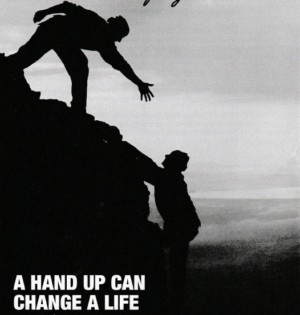Everybody needs a mentor and I wish I had had one when I needed one.
From time to time in any life we come to a crossroad[1], a situation in which we have to make a decision, make a choice. Those are the times when you need an advisor, someone in your corner, someone who can open a door otherwise closed to you, a mentor.
Read that last sentence again.
Most people think of a mentor as someone, usually older, wiser and more experienced, who will give you sage advice from time to time during your life. Maybe even take you to lunch. But when the really critical moments come, it’s more than advice that you need. You also need a hand; an introduction, a recommendation; real help. Without that help, an opportunity that might make a significant difference may not become manifest. At times like these it isn’t the advice we need from a mentor, it’s his connections. The critical moment comes and you may (or may not) get some critical advice, but you still have to make the decision. And take the action. And that may be daunting, a step just a little too high. You need somebody to open that door; to make that call for you, to get that appointment. 
That crossroad came to me early in my formative years. (I wrote about this particular crossroad in my autobiography, ‘My Story, Mostly’.) It wasn’t so much the decision I needed help with – I knew what I wanted to do, or at least try – but I needed help to make it happen. I was a pretty decent football player in my high school days, and I wanted to play university ball when I got there: Queen’s Golden Gaels. My dad encouraged me; my high school football coach ignored me. My dad even knew a fellow in his network (I forget his name) who had played offensive tackle for the Toronto Argonauts. Not sure if he went to Queens’ as a student but nevertheless he surely would have known the legendary Frank Tindal, Head Coach of the Queen’s Golden Gaels. But he didn’t make the call, and I didn’t know better to ask.
I arrived at Queen’s as a Frosh the week after Labour Day with a lot on my mind, mostly fear and trepidation. I was dropped off at Leonard Hall, the Men’s residence I was to live in the next three years, said goodbye to Mom and Dad, and my girlfriend, Marlene, and never felt more alone in my life. I survived the week, endured the orientation sessions, selected my courses and figured out where my classes were; the Golden Gaels were always on my mind but I did nothing about it. That old inner introverted voice kept whispering worry in my brain – maybe I wasn’t good enough. The following week I found my way to Richardson Stadium one late afternoon. The guys were coming out of the locker room for practice. I asked if I could see the coach; ‘he’s right over there.’ I told Mr. Tindall I wanted to try out for his football team. He looked at me, evaluating my 5’8’’ 165# frame I suppose, asked me which position I played; ‘half-back’, I said (there was no ‘running back’ in those days), and he said, kindly enough, ‘sorry kid, camp started two weeks ago and the roster is set now. Why don’t you come out next year? There’ll be an evaluation day in February, come out for that.’
Dejected, and curiously, somehow relieved, I walked back to Leonard Hall, my dream bubble burst. I should have been in touch with Mr. Tindal in August, or even the previous Spring. But I had no one to help me get an introduction and my dream of playing for the Queen’s Golden Gaels evaporated.
The first mentor, or so it goes, was a friend of Odysseus who was asked to be a surrogate father to Odysseus’ son, Telemachus, while Odysseus was away at the Trojan Wars; his name – Mentor. Mentor was to impart wisdom to and share knowledge with the less-experienced Telemachus. It’s not clear if Mentor opened any doors for him. Philip of Macedonia did the same thing for his son Alexander (later ‘the Great’) with Aristotle as mentor; Aristotle was pretty wise, but who taught Alexander to wield a sword?
Since then, I’m sure hundreds of thousands of young men and women have had the guidance of a mentor, not to mention a Svengali, or a Higgins. In my early career, I wasn’t particularly conscious of the concept of a mentor, never mind an active interventionist, only a vague notion that I needed some help and there was none available; nor did I have the sense, or the courage, to ask. A decade later in my beginning Executive HR days in AECL we developed formal mentoring as part of a larger Executive Develoment program; this gave me new awareness of the need – not so much for myself, but that I should be on the lookout for worthy younger professionals (younger? I was still pretty young myself in those days) who could benefit from a career boost.
My two earliest mentorships occurred while I was V.P. Human Resources at Mitel. Both were attractive young woman (and I do hope both regarded my efforts as genuine support without a Svengali agenda). One was a recent graduate from Carleton hired as a junior administrator; but I saw potential in this one and I brought her onto my immediate staff as Executive Assistant to help produce the strategic plan for Human Resources and generally shadow me in high level staff meetings and take follow-up actions. This is a common strategy in large corporations as a way to accelerate learning and experience for high potential managers and executives.
The second case was an experienced high-energy administrator who already had a track record of achievement in recruiting and Human Resources administration. I promoted her to Manager of an H.R. Team providing the full range of Human Resources services to a division within Mitel, but given her personality (very high Conscientiousness) and the endless demands of a high tech company on a roller coaster, she was burning out. She was very bright but didn’t have a university degree and possibly she was overcompensating for this lack; she also felt her career options were limited. But I saw Training and Development in her future. I brought her out of her HR Manager role after she had completed a major assignment of closing down a manufacturing facility and integrating the workers into an aggregated division in Mitel. I brought her on my immediate staff as Executive Assistant (replacing my previous mentee) and persuaded her to enroll in Saint Francis Xavier University’s famous program for training and development facilitators. And then assigned her to the T & D Director implementing Mitel’s staff development programs. She took to it like a duck to water and never looked back. She became a trainer in the program for SFX and later joined the faculty and moved to Antigonish, Nova Scotia.
When I left Mitel and formed AFC Consulting, mostly in executive coaching and career counseling, I had many more opportunities to offer career advice to my clients. But coaching and counseling is not quite the same as mentoring. Mentoring is more informal, and in many ways more intimate, because the mentor/mentee relationship is more personal than in structured programs typical of coaching and counseling. Mentoring[2] can take on many forms, but the form I seemed to adopt was the Nurturing or Friendship Models or some combination of those two. I began to see a pattern in my parallel life as a mentor. A worthy candidate would come into my view and by some mysterious process a mentoring relationship would begin. Rarely were these mentees clients; more often they were young H.R. managers from within the sponsoring organization of the people who had become my clients; sometimes they were people encountered at a professional development event and a networking relationship would evolve into a mentoring one; often the future mentee asked me if I would be his or her mentor. After a couple of years of lunches and reviews the mentee had usually advanced his or her career situation to such an extent that active mentoring became less and less needed, at least from me, and the relationship would drift apart, though some of these relationships have lasted a life-time. I would then be on the look-out for someone else who could get value from a relationship with me.
Over the years I found myself adding a separate category in my annual plan to husband and cultivate mentees.
Mentoring is not a one-way relationship. In every case I was involved in I got something out of the relationship too: Energy, fresh questions, information about his or her company or emerging technology or issues. Savouring the relationship while it is happening is part of the satisfaction. Reflecting (though not basking in it) on your mentee’s career and life success is surely the greatest value you derive. Approbation is nice, but it is not their gratitude you seek, but their success.
As I have shifted my own career more and more to author, rather than Human Resources professional/consultant/coach I have had my eye out for aspiring authors to give them the benefit of my experience and struggles to get published, and get read. I have a current mentee who hopes to complement her career in massage therapy with writing. I hope many people will one day see her imagination in print.
So while I never had the benefit of an active mentor myself, I hope I have made up for that by being a valued mentor to others. Have you, dear reader, taken the time to give someone a hand up in their lives/careers. It’s not too late.
Doug Jordan, reporting to you from Kanata, Canada © Douglas Jordan & AFS Consulting All rights reserved. No part of these blogs and newsletters may be reproduced without the express permission of the author and/or the publisher, except upon payment of a small royalty, 5¢.
[1] Or as Yogi Berra has said, ‘When you come to a fork in the road, take it!’
[2] For an excellent article on mentoring go to Wikipedia, here: https://en.wikipedia.org/wiki/Mentorship#Informal_mentoring



